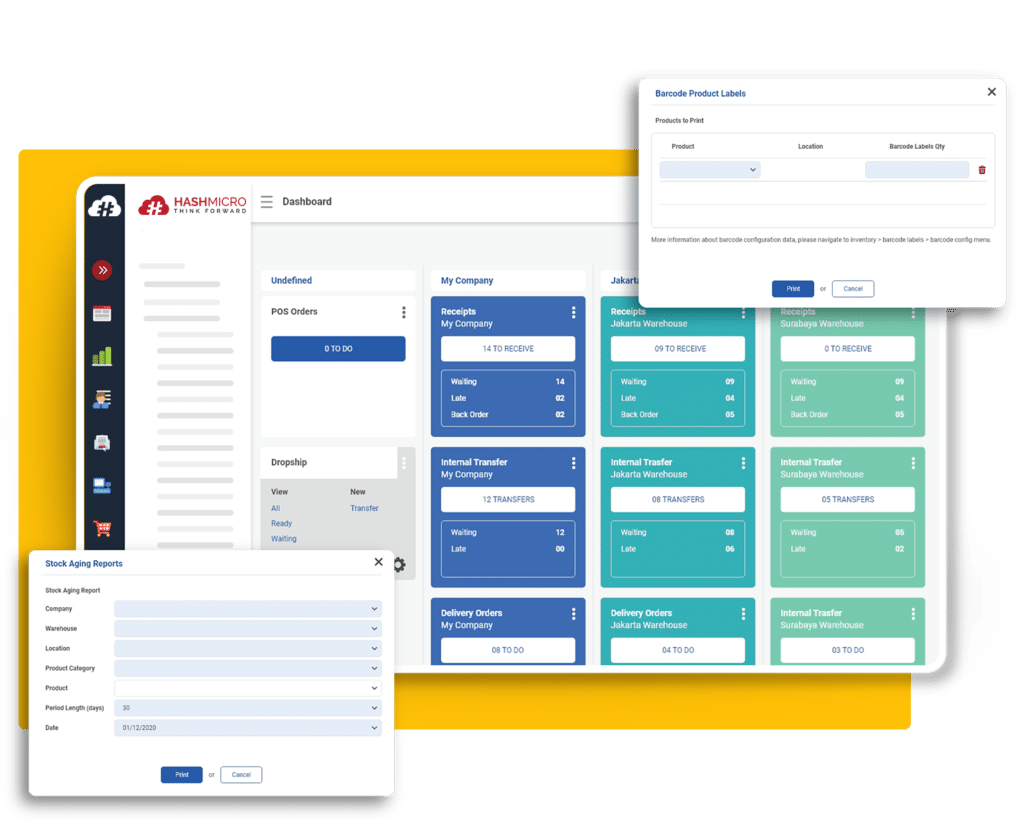Are you struggling with manual inventory management as your startup grows? Many startups face stock mismanagement, human error, and overordering. Therefore, inventory management software offers a solution to streamline and automate processes.
The Asia Pacific inventory management software market, including Singapore, is projected to grow with a compound annual growth rate of 11.9% from 2023 to 2030. This highlights the increasing demand for efficient modern solutions across various sectors.
One of the best inventory management software solutions in Singapore is HashMicro Inventory Management Software, offering automated workflows, real-time supplier tracking, and efficient procurement processes to facilitate smoother operations and increased profitability.
In this article, we’ll review the 16 best procurement software systems in Singapore for 2025, with HashMicro leading the way. These systems are designed to improve procurement efficiency and drive business success.
Key Takeaways
|
Table of Content:
Table of Content
What is Inventory Management for Startups?
Inventory management startups is tracking inventory, organizing, and controlling stock to ensure optimal supply levels. It helps streamline operations by efficiently managing raw materials, finished products, and other inventory-related activities.
Inventory management can prevent overstocking or stockouts, reducing unnecessary costs and improving cash flow. It also provides real-time data on stock levels, enabling better decision-making, quicker fulfilment, and a stronger foundation for scaling operations.
Hashy AI Fact

Need to Know
AI helps you know what you have and what you need before you even need them. HashMicro Inventory Software ensure optimal inventory control with low stock notification and future inventory demand forecast.
Request a free demo today!
Benefits of Startup Inventory Management Software
In the midst of an exciting startup, it is difficult to maintain all the inventory you need. Inventory management software for startups has many benefits. These include:
1. Managing startup inventory cost
Businesses often have limited resources and a small number of employees, which means they have to do everything themselves and rely on their own knowledge. As a result, they may underestimate or undervalue the potential costs of starting their business.
Using suitable inventory management software for startups helps you avoid this problem by providing accurate information about your startup inventory costs so that you know what you’re getting into before investing in opening your business.
2. Managing startup inventory risk
There is always some degree of risk involved in starting a new business venture. However, being aware of these risks can help ease any concerns before investing in something new or at least give peace of mind so that things don’t seem so daunting when looking back later on down the line.
The inventory management startups will provide you with a complete analysis of your startup inventory to inform you of those risks. Additionally, integrating a cloud based inventory system ensures real-time tracking and better risk management for your business.
Also read: ERP System Inventory Management for Your Business
Key Features of Inventory Management Software
Inventory management software offers a range of features to simplify and optimize stock handling. These tools help businesses stay organized, avoid costly mistakes, and improve efficiency. Let’s explore some of the key features and their benefits.
- Real-time inventory tracking: This feature allows startups to monitor stock levels instantly. It provides up-to-date information on product availability, enabling businesses to make timely restocking decisions and prevent stockouts.
- Automated stock updates: Inventory software automatically adjusts stock quantities after each sale or restock. This reduces manual data entry errors, ensures accurate inventory records, and saves time for business owners.
- Low inventory alerts: Startups receive automatic notifications when stock levels fall below a threshold. These alerts help prevent costly fulfilment delays by ensuring that critical products are always available.
- Barcode scanning integration: With barcode scanning, startups can speed up inventory management processes. This feature ensures fast, error-free item tracking and simplifies stock-taking, improving overall efficiency.
- Multi-location management: This feature provides centralized control for startups managing multiple locations or warehouses. It offers visibility into inventory across all sites, ensuring seamless coordination and resource allocation.
- Detailed reporting: The software generates reports on inventory performance, sales trends, and stock movement. Startups can use these insights to make data-driven decisions, optimize operations, and improve profitability.
Also read: Top Inventory Management Software Systems in Singapore
Integrations of Inventory Software
Inventory management software can be integrated into different programs, such as accounting, billing, and purchasing systems. This allows you to track the purchasing of the products that go into your inventory.
Integrating this information will also allow you to determine if there are any problems with the current setup so that changes can be made if needed. There are many benefits to integrating inventory management software into other systems in your startup.
It increased efficiency and accuracy within each system and enhanced communication between all parties involved in managing inventory reconciliation within the company–directly or indirectly.
Additionally, it eliminates potential errors due to duplicated entries because everything stays connected throughout all processes involved in a business.
Top 5 Inventory Management Software for Startups
Choosing the right inventory management software is crucial for startups aiming to streamline operations. Here are the top 5 startup inventory management software to support growing businesses in managing their inventory effectively.
1. HashMicro
HashMicro Inventory Management Software offers comprehensive inventory management software for startups. The system includes barcode scanning, multi-location management, and detailed reporting, making inventory handling efficient and accurate.
The software integrates seamlessly with other business functions like accounting, sales, and procurement. This ensures smooth coordination across departments, while AI-driven analytics help startups make data-backed decisions for growth.
Depending on your business needs, you can explore a tailored inventory management solution that fits your goals. With up to 70% funding support through the CTC Grant, you can experience HashMicro’s system firsthand by requesting a free demo today.
Click the banner below for more details on how HashMicro can transform your startup’s inventory management. You’ll find information on various pricing schemes, ensuring you choose a package that fits your budget and business goals.
2. NetSuite
NetSuite provides inventory management for startups with a unified platform to manage stock levels, sales orders, and procurement. With real-time visibility, businesses can efficiently track inventory across multiple locations and streamline order fulfilment.
Integrating an ERP system allows startups to manage finances, CRM, and inventory in one place. Its advanced reporting tools and demand planning features help businesses optimize stock levels and reduce costs.
3. Monday.com
Monday.com offers a flexible platform that allows startups to customize their inventory management workflows. It provides visual dashboards and automation to track stock movements, making the process more transparent and efficient.
The software supports integrations with other business tools, ensuring seamless data flow. Its collaborative features make it easy for teams to manage inventory together, improving communication and operational efficiency.
4. ShipBob
ShipBob is ideal for startups looking to manage their inventory alongside order fulfilment and shipping. The platform provides real-time tracking and automated fulfilment processes, making it easier for startups to handle logistics.
Its solution integrates with major e-commerce platforms, providing startups with a seamless inventory data flow. ShipBob’s analytics features also offer insights into shipping performance, helping businesses optimize their supply chain.
5. Zoho Inventory
Zoho Inventory offers inventory management startups for managing inventory, orders, and shipments. It includes multi-channel selling, automated workflows, and real-time stock tracking, making it a versatile tool for growing businesses.
The software integrates smoothly with other Zoho apps, providing a complete ecosystem for managing different aspects of the business. Its customizable features make it ideal for startups looking for an affordable and efficient solution.
How to Source Inventory for Your Startup
Getting inventory right is crucial for the success of any startup. The way you source and manage your inventory will directly impact your cash flow, operations, and customer satisfaction. Here’s a step-by-step approach to help you secure inventory and build a solid supply chain.
1. Define Your Product Requirements
Before you begin sourcing, it’s essential to clearly define what you need:
- Product Type: Are you dealing with raw materials, finished products, or a mix of both? Identifying this upfront will guide your supplier search.
- Quantity Planning: Estimate the amount of inventory you’ll need based on sales projections. Start small and scale as you gain insights into demand.
- Quality Control: Make sure the products align with your quality standards. Whether it’s materials or finished goods, consistency matters.
2. Source Reliable Suppliers
Building relationships with dependable suppliers is key to maintaining a steady inventory flow:
- Research Suppliers: Explore local and international suppliers through platforms like Alibaba, ThomasNet, or local trade directories. Look for suppliers with strong reputations and track records.
- Network at Trade Shows: If possible, attend industry trade shows or online events. These are great places to meet suppliers, get samples, and negotiate better deals.
- Negotiate Terms: Price is important, but don’t overlook lead times, payment terms, and return policies. Negotiating favorable terms will ensure smooth operations.
3. Start Small and Test
Don’t overcommit from the start:
- Small Test Orders: Place smaller orders initially to test the market, assess supplier reliability, and understand demand. This also gives you an opportunity to fine-tune your inventory management.
- Build Relationships: Establish strong partnerships with your suppliers. Good relationships can lead to better terms, priority support, and flexibility in future orders.
4. Look for Local Sources
Local suppliers can offer significant advantages:
- Faster Delivery: Working with local vendors means quicker turnaround times and lower shipping costs.
- Wholesale Markets: Depending on your location, you may find local wholesale markets that offer competitive prices for bulk purchasing.
5. Leverage Technology for Inventory Management
Managing inventory effectively is key to avoiding stockouts and overstocking:
- Inventory Management Software: Invest in tools like HashMicro or other inventory management platforms to keep track of stock, optimize reorder cycles, and ensure you never run out of key products.
- Forecasting Demand: With the right tools, you can analyze sales trends and forecast demand, helping you order just the right amount of inventory.
6. Consider Dropshipping (for E-Commerce Startups)
If you’re running an e-commerce startup, dropshipping can be a low-risk way to start:
- Zero Upfront Costs: Dropshipping allows you to sell products without needing to purchase inventory upfront. The supplier ships products directly to your customers.
- Risk-Free Testing: This model allows you to test different products without the risk of holding excess stock, making it a great option for early-stage businesses.
7. Track and Optimize Your Inventory
Once you have inventory in place, keeping track of it efficiently is essential:
- Monitor Stock Levels: Use your inventory system to monitor real-time stock levels and avoid shortages or overstocking.
- Set Reorder Points: Set automatic reorder points to ensure you never run out of high-demand products, while keeping excess inventory at bay.
Conclusion
Inventory management software for startups requires some form of inventory software to help them succeed. The right software will adapt to the changes you face, ultimately allowing you to make smarter business decisions with real-time data.
Implementing HashMicro’s Inventory Management Software for startups streamlines inventory management processes and provides valuable insights that drive growth and scalability.
Embrace the technology that leading startups trust to stay competitive and ensure your business is equipped for long-term success. Fill out the available form now to get the free demo today!

FAQ About Inventory Management Startups
-
How do I start managing inventory?
To start managing inventory, organize and categorize all stock items, set up a tracking system (manual or digital), and establish reorder points. Then, regularly conduct inventory audits to monitor stock levels, ensuring accurate data for decision-making.
-
How to enhance inventory management?
Enhance inventory management by using automation tools to track real-time stock levels, forecast demand, and optimize reorder points. Implement barcode scanning and streamline processes to reduce errors, increase efficiency, and prevent overstocking or stockouts.
-
Can ERP be used for inventory management?
Yes, ERP can be used for inventory management by integrating various business functions into one system. It offers real-time tracking, automates stock updates, and provides valuable insights into inventory trends, enabling better decision-making and improving overall efficiency.
























































